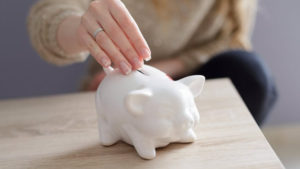23 Reasons Why You’ll Always Be Broke
Many Americans are clearly not experts at managing their own finances and end up broke month after month. The cycle of overspending leaves them poor, even if their income means they are considered well above the poverty line. A third of higher-income households — those that bring in $75,000 or more a year — live paycheck to paycheck, found a recent survey from SunTrust Banks
Then there are other factors, like the average per-household amount of credit card debt that stands at nearly $16,000 and dismal savings — 73% of Americans have less than $1,000 in their savings account. It raises the question: Why are people with relatively good income always broke?
GoBankingRates talked to 23 personal finance experts, asking them all the same question: What is the No. 1 reason people end up poor or in financial hardship? Click through to find out what problems they say are keeping you broke, as well as what they think you should do to improve your situation.
1. You’re Stuck in a Debt Trap
“When you’re poor, it’s easy to get stuck in a debt trap because you’re desperate,” said Kristin Wong of Brokepedia. “Whether it’s a payday loan, debt settlement scam, or even just using a credit card for an emergency, it’s easy to make rash decisions when you’re stressed, and these decisions usually keep people broke.”
2. You’re Ignoring Big Debts
When you’re broke, stacks of bills and overdue notices are a huge source of anxiety and dread. But avoiding those problems and failing to manage your debts only makes them worse, according to Robert Farrington, founder of The College Investor.
“A lot of young adults are burdened by student loans and other debt, yet they don’t realize there are a lot of options out there for them,” Farrington said. “For example, for student loans, there are tons of programs that can help with lower payments and even forgiveness. But you have to take positive action and seek out these programs.”
3. You Feel Powerless
When you’re poor or in the middle of a financial hardship, it can make you feel powerless to do anything to change it. But giving in to those feelings of helplessness will only hurt you, said AJ Smith, vice president of content strategy and managing editor of SmartAsset.
“By getting accurate, unbiased knowledge and advice, people can feel empowered and confident in their personal finance decisions,” Smith said. “They can then takes steps to make a better financial future.”
Read More: How to Find Out If You Have Debt in Collections
4. You Haven’t Learned About Personal Finance
“Most people are broke because they don’t learn about personal finance,” said the founder of Lazy Man and Money. He added that one example of the dangers of debt is that it has compound interest working against you instead of for you as it does with investments.
5. You Don’t Pay Yourself First
“The No. 1 reason people end up poor is because they don’t ‘pay themselves first,’” said personal finance expert Barbara Friedberg. Paying yourself first means putting a portion of each paycheck into a savings account before divvying the rest out to cover expenses. The No. 2 cause is “paying with credit,” Friedberg said.
6. You Put Today’s Happiness Before Future Financial Needs
Poverty is often generational, according to Luke Landes, a speaker and personal finance writer at Consumerism Commentary. You might be poor simply because your family always has been, “which is one of the hardest environments for making progress,” Landes said.
7. You Lack an Emergency Fund
Jeff Rose, founder of GoodFinancialCents.com, listed his top four biggest ways people hurt themselves financially:
- “Not knowing how much debt they really have and how much interest they are paying.
- Not having nearly enough cash savings in emergency funds.
- Not recognizing they need to save for retirement.
- Being oblivious to what is going on with their credit history. That’s as simple as requesting your free credit report and making sure all your information is correct.”
“In my own life, I saw the biggest financial stagnation when I wasn’t paying myself first, even when I had a nice-paying job,” said personal finance expert Philip Taylor of PT Money. “When you get paid, make sure you are saving those first few dollars for your future.”
“Do it automatically each pay period, and you’re more likely to stick with it,” he said. “You get ahead financially by making savings a priority.”
9. You Don’t Course-Correct Your Finances
“There’s almost always a cheaper or better way of doing something, but you have to get into the habit of questioning and challenging your current way of going about it,” said Stefanie O’Connell of The Broke and Beautiful Life. “Use your creativity and critical-thinking skills to find and implement more cost-effective alternatives, whether it’s renegotiating your insurance rates, switching banks or planning your next vacation.”
10. You’re Spending Too Much on Housing
It might be time to consider moving to a smaller place. “Spending too much money on rent or a mortgage,” is the biggest reason people struggle financially, said Andy Josuweit, CEO of Student Loan Hero. “After living in New York City for a few years, I met dozens of young people who were ‘house poor.’”
“These were people who make above-average incomes but end up spending too much on rent,” he said. “As a rule of thumb, you should try to keep housing costs under 20% of your income, as opposed to the 28% to 30% limit that most banks allow.”
Read: Why You Need to Start Treating Your Debt Like an Emergency
11. You Don’t Have a Money Plan
The biggest reason people stay poor, according to Elle Martinez of Couple Money, is “not having a plan for their money.” “It is easy to hope that there is money left over at the end of the month, but many times, our behavior gets in the way.”
12. You Don’t Know Where Your Money Is Going
Donna Freedman, a personal finance expert and writer, said the biggest thing she sees keeping people in the paycheck-to-paycheck cycle is not having a budget. “If you don’t know where your money is currently going, you can’t turn it in the direction you’d prefer it would do the most good,” Freedman said, whether that’s saving up an emergency fund, staying current on rent or mortgage payments, working toward retirement savings or even paying for a vacation in cash.
“When you know you have enough money to deal with all of your needs and some of your wants — plus those pesky emergencies — you can sleep very well at night.”
13. You Don’t Separate Wants From Needs
“People, generally speaking, have a hard time differentiating wants and needs,” said Grayson Bell, personal finance blogger at Debt Roundup. “They use the word ‘need’ for almost everything they purchase, causing them to actually believe they ‘have’ to spend the money.”
“You might ‘need’ a car for transport, but you ‘want’ the luxury model,” he said. “This mentality keeps us down financially.”
14. You Have No Degrees or Training
Louis DeNicola, a consumer expert and writer for Cheapism.com, said that sometimes it comes down to unfortunate circumstances that work against you. Many people lack access to good-paying jobs and have limited time or opportunity to receive training that would allow them to get one of those jobs, according to DeNicola.
15. You’re Investing In Stuff Instead of Yourself
Julie Rains, personal finance writer and founder of Investing to Thrive, also said that economic disadvantages play a big part in why some people are poor, but that’s not the only thing holding people back. “Others might find themselves in crises because they have repeatedly underinvested in areas with long-term benefits — [such as] professional career and education, savings, investments — and overinvested and overextended themselves in other areas, such as luxury products and upscale housing.”
16. You’re Trying to Get Rich Quick
Too many people are looking for the quick and easy way out of poverty and are trying to get rich quick, said Jon Dulin, founder of Money Smart Guides. “Whether it be a hot stock, a job or business idea, too many of us chase the idea that we can come into extraordinary wealth overnight,” Dulin said.
“Sadly, it doesn’t work this way,” he said. “You have to put in the hard work to become rich. We see the rich now thinking they got lucky or made it without much work. But we don’t see behind the scenes at just how much work they put in to get where they are.”
17. You Don’t Stick to a Budget
Having a budget is personal finance 101, yet many people still don’t have a budget or don’t stick to one. “Many end up in financial hardship because they think they don’t need a budget,” said Michelle Schroeder-Gardner, personal finance blogger at Making Sense of Cents.
18. You’re Always One Step Behind Your Bank Account
“Not planning ahead is the number one reason I was broke as a younger me,” said Linsey Knerl, blogger at 1099 Mom. From not keeping track of due dates and getting hit with late fees to not planning out trips and losing track of deposits and withdrawals that led to overdraft fees, planning was her big challenge, she said.
“It was never about not having enough money initially,” Knerl said. “It was that I was so bad at planning and I missed important opportunities to hold onto it. It’s the little things that kill a budget.”
19. You Buy Depreciating Assets
“One of the main reasons that people can become poor is that they focus their time on buying depreciating assets like cars, ATVs, boats, etc.,” said Deacon Hayes, personal finance blogger at Well Kept Wallet. “Because of this, they have little resources to build wealth and, therefore, they continue to live paycheck to paycheck.”
How can you fix this problem? “Focus on buying appreciating assets like stocks and real estate, which would grow over time and eventually give them more resources so that they are no longer living in poverty,” Hayes said.
Read More: How Dave Ramsey Helped This Family Pay Down $110K in Debt
20. You’re Unwilling to Sacrifice
“The No. 1 reason people end up poor or in some type of financial hardship is because of bad behavior,” according to Brian Fourman, personal finance blogger at Luke1428. “Success with money is only 20% head knowledge,” he said. “A person’s actions have to change in order to win, and most aren’t willing to sacrifice and do that.”
21. You’re Trying to Have It All
Pauline Paquin, personal finance blogger at Reach Financial Independence, said, “People end up broke because they want too many things too soon.” This is especially challenging for recent college grads who go from living on peanuts to having a livable paycheck but still can’t “realistically afford the new house and the new car and the nights out and the holidays abroad,” she said. This gets particularly dangerous when you start using credit to fund all those purchases, which “can cripple your future financial life,” Paquin said.
Instead of trying to have it all, Paquin advised picking one big “want” to budget for and leave the rest for the future when you’ve had a chance to build up some savings and earn a pay raise. “Living one more year like a student while saving your first paychecks can help tremendously.”
22. You’re Paying Too Much for Your Cell Phone
Lance Cothern of Money Manifesto said that the No. 1 reason people end up broke is that “they buy cell phones and cell phone plans they can’t afford.” Instead of opting for a top-of-the-line smartphone and unlimited data, he said, “People should stick with cheaper phone carriers that have affordable rate plans, no contracts and lower-cost phones that you aren’t pressured to upgrade every year or two.”
“You can get phone plans that only cost $10 a month plus taxes for a simple unlimited talk-and-text plan if you look in the right places,” Cothern said. “That definitely beats $100 a month plus expensive upgrade fees to get the latest iPhone.”
23. You Spend More Money Than You Make
Nick Loper, founder of Side Hustle Nation, said the root cause of being broke is nearly always the same: People “spend more than they make.” “As far as I know, that’s the only cause of bankruptcy,” Loper said.
“The good news is you can tackle this from both sides of the equation,” he said. “Spend less to live within your means and work to earn more so you have more financial breathing room.”
This article originally appeared on GoBankingRates.
Click here to get my free eBook: Money Management 101























